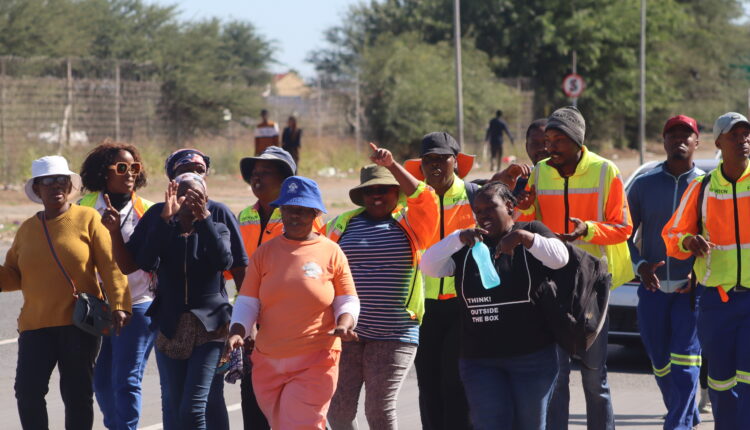Operation Fiela at Indian Centre
By Karabo Ntanzi
Pictures by: Rebaone Prophy
Community members from Galeshewe joined Operation Fiela in its quest to restore dignity to the Indian Centre by cleaning the premise.
Twenty people accompanied by the South African Police Service (SAPS) and traffic officials marched from Kemo Hotel to the Indian Centre last Friday. The organiser, Bishop Thabisho Louw, said they were not bothered by the low turnout because they understood that people live in fear.
Louw indicated that the objective is to eliminate the dirt that has engulfed the centre.
“We do not have training facilities in Kimberley. The intention is to convert these defunct buildings into skills development centres. We will start by cleaning the outside. We will remove the physical dirt and then we will be moving inside to get rid of all unwanted elements starting with the drug dealers and illegal occupants,” the Bishop reiterated.
He added that they had a consultative process with the relevant stakeholders before this activity. However, it was a challenge to track down the rightful owners of the premises because most of them had passed on and family members inherited the buildings, some of them are out of town.
In line with the constitution, Operation Fiela members were advised to give occupants at least three months’ notice to vacate the premises.
According to the sources, the centre was established between 1975 and 76′. It emanated from the group areas act when Indian business owners operating in the CBD were displaced. The owners formed a company, bought the land, and developed it into a thriving business.
Business owners grappled with fear spoke on condition of anonymity and explained that the once thriving economic centre started deteriorating when the Builtfontein road was closed due to threats of the Big Hole caving in. As a result, all businesses opposite the Big Hole, including the taxi rank, were closed down.
Another owner said they are plagued by fronting, mainly from South Africans who would approach them under the pretense of being the business owners, later to foreign nationals occupying and running businesses. To secure the premises, rent would be paid up to three months up front.
Taxi owners and drivers from the long-distance Taxi Association also indicated that since foreign nationals started occupying the buildings, this attracted many shady characters, including homeless people. The Association also claims that despite constant police presence in the area, druglords still carry on their business, raising concerns about corruption by the Police.
Taxi owners also complain of theft. One owner said he lost a trailer three years ago; however, they remain vigilant and protect their clients.
During the clean-up, members marked some premises identified as hot spots and used spray paint to remind the occupants of their imminent departure.
Boitumelo Oshupeng who owns a bottle store business with her foreign husband, vowed not to abandon her business, saying she is not doing anything illegal, “I have mounted cameras in and around the premise to monitor these so-called illegal dealings. As a parent, I will not allow drugs to be sold near or close my business.”
She added that although she is bothered by the dirt surrounding her business, it is not her responsibility to clean the area. “If people dump and soil the place up, that is not my problem,” said the business owner.
Louw appreciated those who supported the initiative by donating all the needed resources and materials. He also thanked the Sol Platjie Municipality, who provided refuse bags, collected the rubbish and helped transport volunteers home.
He warned the illegal occupants that Operation Fiela will return and finish what they have started while noting that inconsistency is one of the reasons these types of initiatives fail.


Comments are closed.